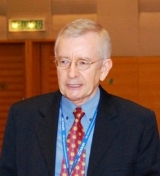
Asia-Pacific Broadcasting Union
Encyclopedia
The Asia-Pacific Broadcasting Union (ABU), formed in 1964, is a non-profit, professional association of broadcasting organisations. It currently has 200 members in 57 countries and regions, reaching a potential audience of about 3 billion people.
The ABU's role is to help the development of broadcasting in the Asia-Pacific region and to promote the collective interests of its members. The ABU covers an area stretching from Turkey
in the west to Samoa
in the east, and from Russia
in the north to New Zealand
in the south. Its secretariat is located in Kuala Lumpur
, Malaysia.
One of the ABU's activities is Asiavision, a daily exchange of news feeds by satellite
among television stations in 20 countries in Asia. The ABU also negotiates coverage rights to major sports events for its members collectively, and carries out a wide range of activities in the programme and technical areas.
The ABU provides a forum for promoting the collective interests of television and radio broadcasters, and encourages regional and international co-operation between broadcasters.
Full members must be national free-to-air
broadcasters in the Asia-Pacific region, but there is an associate membership category that is open to provincial broadcasters, subscription broadcasters and national broadcasters in other parts of the world, and an affiliate category that is open to organisations connected to broadcasting.
The ABU works closely with the regional broadcasting unions in other parts of the world on matters of common concern, and with many other international organisations, to exchange information on the latest developments in broadcasting, undertake activities to improve the skills and technologies of its members, and encourage harmonisation of operating and technical broadcasting standards and systems in the region.
The ABU is funded primarily by annual subscriptions from members. The Union has an elected President and three Vice-Presidents, who serve three-year terms. The current President is Yoshinori Imai of NHK-Japan.
The ABU Secretariat is located in Kuala Lumpur, Malaysia. It has over 30 staff, of whom 12 are broadcast professionals recruited from among the ABU members within the region. The head of the Secretariat is the Secretary-General, who is appointed by the General Assembly. The current Secretary-General is Javad Mottaghi.
The Asia-Pacific region is defined in the ABU statutes as countries within areas of Asia and the Pacific that lie substantially between the longitudes of 30 degrees east and 170 degrees west. On the map, this region stretches from Turkey in the west, to Samoa in the east, and from Russia in the north, to New Zealand in the south. All of the ABU's full members operate in this region.
Most of the ABU's associate members are European and North American broadcasters, many of whom have operations in Asia, and pay-TV and cable operators in the Asia-Pacific. Its affiliate members include satellite providers, telcos, production companies, equipment vendors and regulators.
The ABU is the third largest of the world's eight broadcasting unions, but covers the largest geographic area of the world.
The Bureau supervises the ABU technical activities on behalf of the TC in the period between the TC meetings.
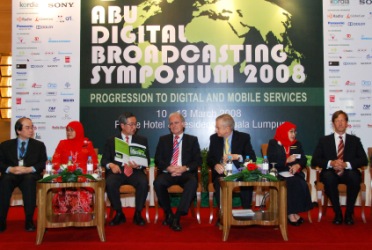 The Digital Broadcasting Symposium 2010 took place in Kuala Lumpur on 9–11 March 2010. Its theme was Leveraging the Digital Advantage. The conference, exhibition and 10 workshops attracted 550 participants including 66 speakers. A total of 37 countries were represented. The symposium takes place annually. The 2011 symposium will be held on 8–11 March.
The Digital Broadcasting Symposium 2010 took place in Kuala Lumpur on 9–11 March 2010. Its theme was Leveraging the Digital Advantage. The conference, exhibition and 10 workshops attracted 550 participants including 66 speakers. A total of 37 countries were represented. The symposium takes place annually. The 2011 symposium will be held on 8–11 March.
digital broadcast environment. New initiatives have been taken to enhance services specifically directed to the developing broadcasters. Tharaka Mohotty of MTV-Sri Lanka chairs the Developing Broadcasters’ Forum.
The Forum is chaired by Abu Bakar Ab Rahim from RTM-Malaysia.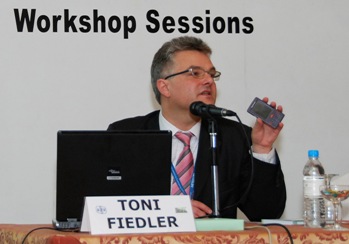
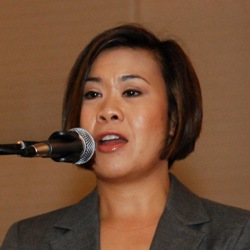
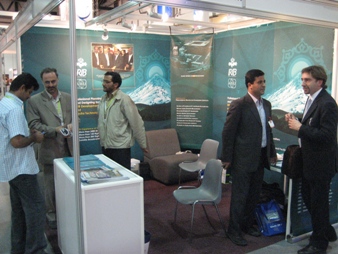 The Broadcast Engineering Excellence Award is being sponsored by Broadcast and Professional Pacific Asia Company (BPPA).The award includes a study tour of Sony research facilities.
The Broadcast Engineering Excellence Award is being sponsored by Broadcast and Professional Pacific Asia Company (BPPA).The award includes a study tour of Sony research facilities.
The ABU's role is to help the development of broadcasting in the Asia-Pacific region and to promote the collective interests of its members. The ABU covers an area stretching from Turkey
Turkey
Turkey , known officially as the Republic of Turkey , is a Eurasian country located in Western Asia and in East Thrace in Southeastern Europe...
in the west to Samoa
Samoa
Samoa , officially the Independent State of Samoa, formerly known as Western Samoa is a country encompassing the western part of the Samoan Islands in the South Pacific Ocean. It became independent from New Zealand in 1962. The two main islands of Samoa are Upolu and one of the biggest islands in...
in the east, and from Russia
Russia
Russia or , officially known as both Russia and the Russian Federation , is a country in northern Eurasia. It is a federal semi-presidential republic, comprising 83 federal subjects...
in the north to New Zealand
New Zealand
New Zealand is an island country in the south-western Pacific Ocean comprising two main landmasses and numerous smaller islands. The country is situated some east of Australia across the Tasman Sea, and roughly south of the Pacific island nations of New Caledonia, Fiji, and Tonga...
in the south. Its secretariat is located in Kuala Lumpur
Kuala Lumpur
Kuala Lumpur is the capital and the second largest city in Malaysia by population. The city proper, making up an area of , has a population of 1.4 million as of 2010. Greater Kuala Lumpur, also known as the Klang Valley, is an urban agglomeration of 7.2 million...
, Malaysia.
One of the ABU's activities is Asiavision, a daily exchange of news feeds by satellite
Satellite
In the context of spaceflight, a satellite is an object which has been placed into orbit by human endeavour. Such objects are sometimes called artificial satellites to distinguish them from natural satellites such as the Moon....
among television stations in 20 countries in Asia. The ABU also negotiates coverage rights to major sports events for its members collectively, and carries out a wide range of activities in the programme and technical areas.
The ABU provides a forum for promoting the collective interests of television and radio broadcasters, and encourages regional and international co-operation between broadcasters.
Full members must be national free-to-air
Free-to-air
Free-to-air describes television and radio services broadcast in clear form, allowing any person with the appropriate receiving equipment to receive the signal and view or listen to the content without requiring a subscription or one-off fee...
broadcasters in the Asia-Pacific region, but there is an associate membership category that is open to provincial broadcasters, subscription broadcasters and national broadcasters in other parts of the world, and an affiliate category that is open to organisations connected to broadcasting.
Overview
The ABU's activities include:- a daily satellite TV news exchange (Asiavision)
- co-production and exchange of programmes
- negotiating rights for major sports events and organising coverage
- technical, programming and management consultancy services
- advising members on copyright and legal matters
- rights-free content acquisition for developing countries
- representing members in international forums
- international frequency planning and coordination
- organising seminars, workshops and training courses
- annual competition for radio and television programmes (ABU Prizes)
- a robot competition for engineering students (Robocon)
- publication of ABU News and Technical Review
- starting 2012: Asiavision Song Contest (Asian version of the Eurovision Song Contest)
The ABU works closely with the regional broadcasting unions in other parts of the world on matters of common concern, and with many other international organisations, to exchange information on the latest developments in broadcasting, undertake activities to improve the skills and technologies of its members, and encourage harmonisation of operating and technical broadcasting standards and systems in the region.
The ABU is funded primarily by annual subscriptions from members. The Union has an elected President and three Vice-Presidents, who serve three-year terms. The current President is Yoshinori Imai of NHK-Japan.
The ABU Secretariat is located in Kuala Lumpur, Malaysia. It has over 30 staff, of whom 12 are broadcast professionals recruited from among the ABU members within the region. The head of the Secretariat is the Secretary-General, who is appointed by the General Assembly. The current Secretary-General is Javad Mottaghi.
The Asia-Pacific region is defined in the ABU statutes as countries within areas of Asia and the Pacific that lie substantially between the longitudes of 30 degrees east and 170 degrees west. On the map, this region stretches from Turkey in the west, to Samoa in the east, and from Russia in the north, to New Zealand in the south. All of the ABU's full members operate in this region.
Most of the ABU's associate members are European and North American broadcasters, many of whom have operations in Asia, and pay-TV and cable operators in the Asia-Pacific. Its affiliate members include satellite providers, telcos, production companies, equipment vendors and regulators.
The ABU is the third largest of the world's eight broadcasting unions, but covers the largest geographic area of the world.
Full membership
Free-to-air broadcasting organisations in independent countries in the ABU region may apply for Full, Additional Full or Associate membership, provided that (a) they provide broadcasting services of a national character or national importance in the countries of their location; and (b) they actually produce and/or commission under their own editorial control a substantial proportion of their programme output. Membership fees are determined by the applicant’s annual operating expenditure. There are only two Full members in each country so that there is a balance of voting rights across the region. The principal voting rights relate to approving amendments to the ABU Statutes, election of office bearers, and the admission of new members.Additional full membership
Free-to-air broadcasting organisations in independent or non-independent areas (such as Special Administrative Regions) in the ABU region may apply for Additional Full or Associate membership, provided they fulfill the conditions (a) and (b) in the paragraph above. Additional Full members enjoy the same rights of membership as Full members, but with more limited voting rights. Membership fees are determined by the applicant’s annual operating expenditure and are less than those of Full members.Associate membership
There are six sub-categories which allow free-to-air broadcasters, subscription broadcasters and broadcasting associations to qualify for Associate membership. Associate members enjoy the same rights of membership as Full and Additional Full members, except that they are not entitled to vote or be eligible for nomination to the Administrative Council. Membership fees are determined by the applicant’s annual operating expenditure and are less than those of Full and Additional Full members.Affiliate membership
Affiliate membership is offered to organisations who do not qualify for Full, Additional Full or Associate membership. These include non-broadcasters, regulators, satellite operators, related industry service providers and other corporate bodies interested in maintaining a close relationship with the broadcasting industry. Affiliate membership fees are determined by the applicant’s annual revenue and range from US$1,000 to US$5,000.Institutional membership
This category of membership may be offered to international organisations, usually on the basis of reciprocal membership being offered to the ABU. Institutional membership is granted through the invitation of the ABU’s Administrative Council.Technical Committee Meeting
The Technical Committee (TC), comprising representatives of the technical departments of ABU members, meets each year prior to the General Assembly. At these meetings a host of activities are programmed, providing opportunities to members to participate in technical workshops, symposiums, forum meetings and invited presentations, all designed to impart the latest information on current technologies and their trends. The meeting is information packed and is a must-attend event. ABU Engineering Excellence Awards are announced and the Technical Review Prizes are presented.Technical Bureau Meeting
The Technical Bureau, which consists of 15 members representing all categories of member broadcasters in the region, meets twice each year. The first meeting, which takes place in conjunction with the TC, assesses activities proposed for the ensuing year, in terms of relevance to members and the industry as a whole. The mid-year (second) meeting reviews progress achieved to date and makes course corrections, if necessary.The Bureau supervises the ABU technical activities on behalf of the TC in the period between the TC meetings.
Digital Broadcasting Symposium 2010

Developing Broadcasters Forum
The ABU Developing Broadcasters’ Forum provides a platform for our developing broadcasters to articulate their specific needs and express their concerns in a less formal, interactive environment. The Forum meets on the sidelines of the annual TC meeting and addresses a range of issues including the specific needs and challenges of these members to prepare them for thedigital broadcast environment. New initiatives have been taken to enhance services specifically directed to the developing broadcasters. Tharaka Mohotty of MTV-Sri Lanka chairs the Developing Broadcasters’ Forum.
ABU Digital Radio Forum
The forum comprises members who are digital radio experts. It also includes outside experts. Asaad Bagharib of MediaCorp Radio-Singapore chairs the forum. Members of the forum produce reports on developments in the field of digital radio.ABU ICT Forum
The ABU ICT Forum functions as a Working Party to address usage of the modern information and communication delivery platforms from the broadcasters’ perspective. A long-term objective is to assist ABU members in preparing initial plans for providing services using the new media. The Forum has more than 85 members.The Forum is chaired by Abu Bakar Ab Rahim from RTM-Malaysia.

ABU HD Advisory Group
The HD Advisory Group provides advice to the TC and ABU members on crucial issues that pertain to HDTV and its potential implementation by broadcasters. It is headed by Yeo Kim Pow of MediaCorp-Singapore. The group also maintains a watching brief on HDTV developments within the region and beyond.Emergency Warning Broadcasting System (EWBS) for the Asia-Pacific region
EWBS development work has focused on identifying a suitable country code methodology. This system of codes has now been standardised by ITU-R. The General Assembly in Beijing endorsed the work carried out by the TC and issued an ABU Declaration calling all members to encourage their respective governments to implement an EWBS system.ABU Content Exchange Network (CEN)
To examine how best a network can be established to facilitate exchange of content among the members, a Working Party has been set up. To assist the Working Party on technical issues, a Task Group was formed to identify technical and operational parameters for the network.Publications
The Technical Department continued to publish its regular publication, the Technical Review, which is now a quarterly journal. The Technical Review is available for members to download in PDF format at the members area of the ABU website (www.abu.org.my).
ABU Engineering Excellence Awards
ABU Engineering Industry Excellence Award and ABU Broadcast Engineering Excellence Award are presented annually to broadcast personalities who have made significant contributions respectively to their organisations and to the industry as a whole. They are selected from nominations made by ABU members and followed by an evaluation process by a panel of judges.
Inter-union activities
The World Broadcasting Unions (WBU) brings together eight unions including the ABU. The WBU has a number of specialised forums, including the International Satellite Operations Group (WBU-ISOG) and the Technical Committee (WBU-TC). The ABU is an active member of both.See also
- European Broadcasting UnionEuropean Broadcasting UnionThe European Broadcasting Union is a confederation of 74 broadcasting organisations from 56 countries, and 49 associate broadcasters from a further 25...
- North American Broadcasters AssociationNorth American Broadcasters AssociationThe North American Broadcasters Association is a non-profit group of broadcasting organizations in the United States, Canada and Mexico...
- ABU Robocon
- KBS
- NHKNHKNHK is Japan's national public broadcasting organization. NHK, which has always identified itself to its audiences by the English pronunciation of its initials, is a publicly owned corporation funded by viewers' payments of a television license fee....
- TVNZTelevision New ZealandTelevision New Zealand, more commonly referred to, and stylized as TVNZ, is a government-owned corporation television network broadcasting in New Zealand and parts of the Pacific. It operates TV1, TV2, TVNZ7, TVNZ Heartland, TVNZ U and new media services....
- ABCAustralian Broadcasting CorporationThe Australian Broadcasting Corporation, commonly referred to as "the ABC" , is Australia's national public broadcaster...
- World Radio NetworkWRN BroadcastWRN Broadcast, formerly known as WRN, is an international broadcast services company that works with television channels and radio broadcasters, media owners and brands enabling them to deliver content to target audiences worldwide....
- Commonwealth Broadcasting AssociationCommonwealth Broadcasting AssociationFounded in 1945, the Commonwealth Broadcasting Association is a representative body for public service broadcasters throughout the Commonwealth. A not-for-profit non-government organisation, the CBA is funded by subscriptions from 102 members and affiliates from 53 countries...

